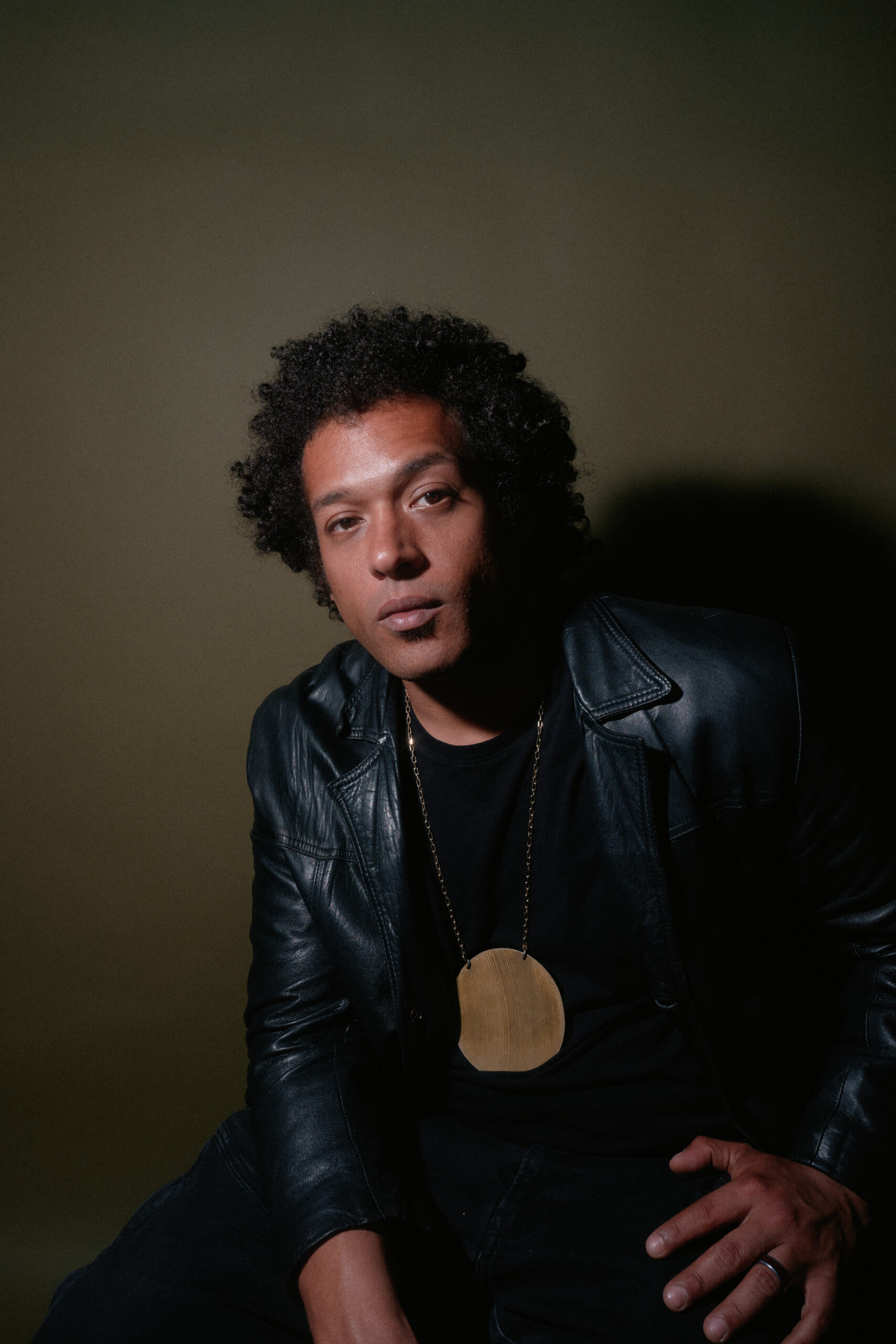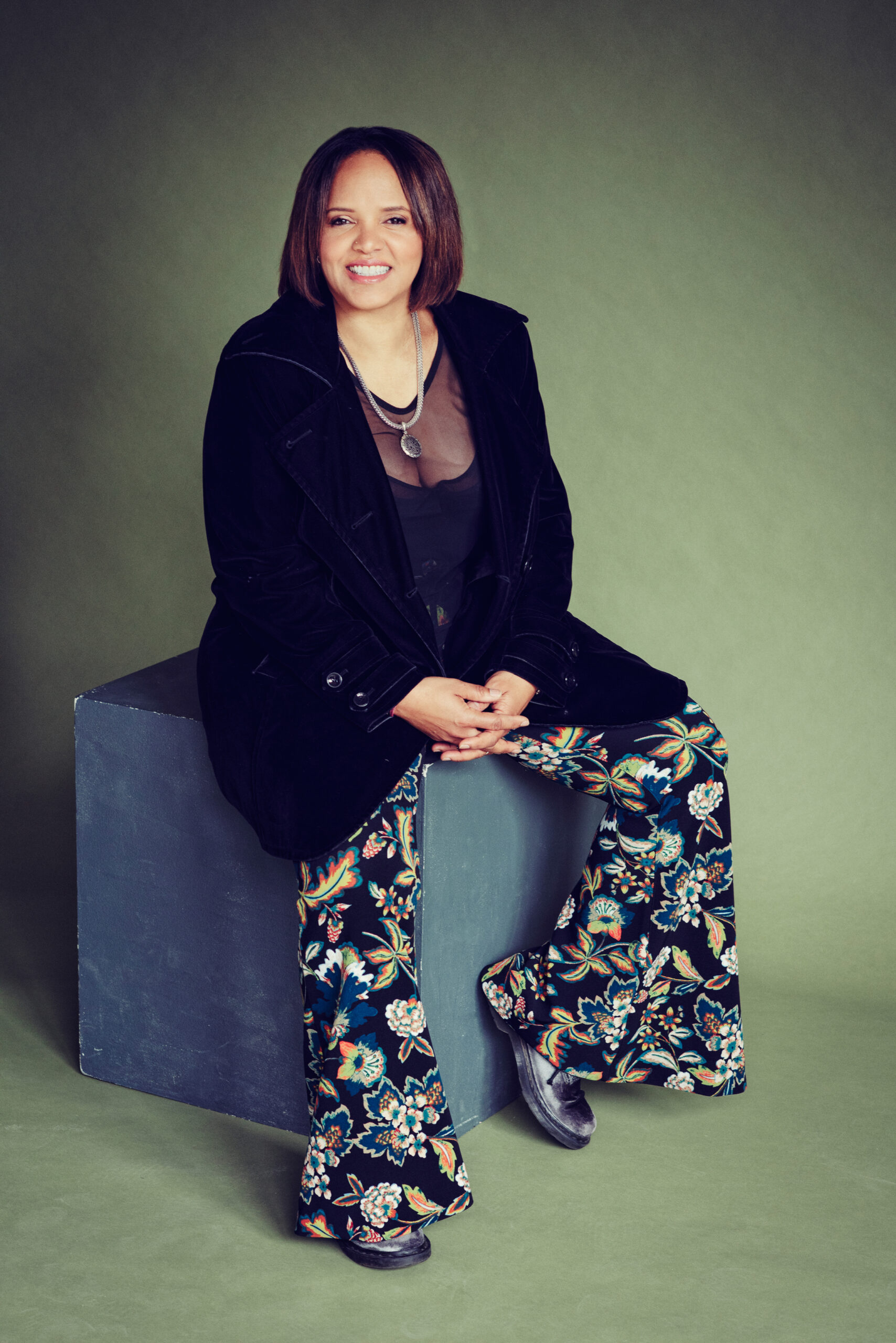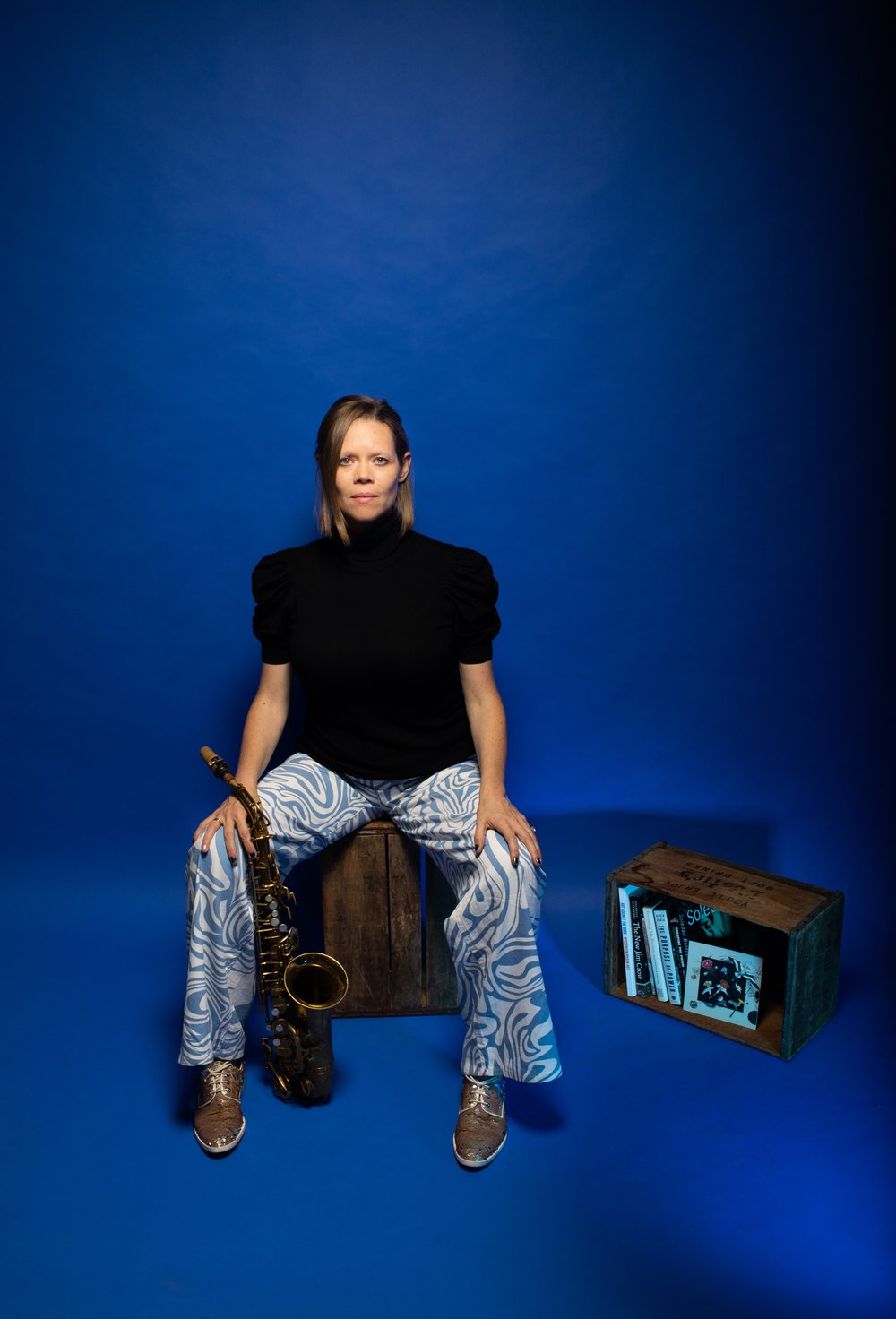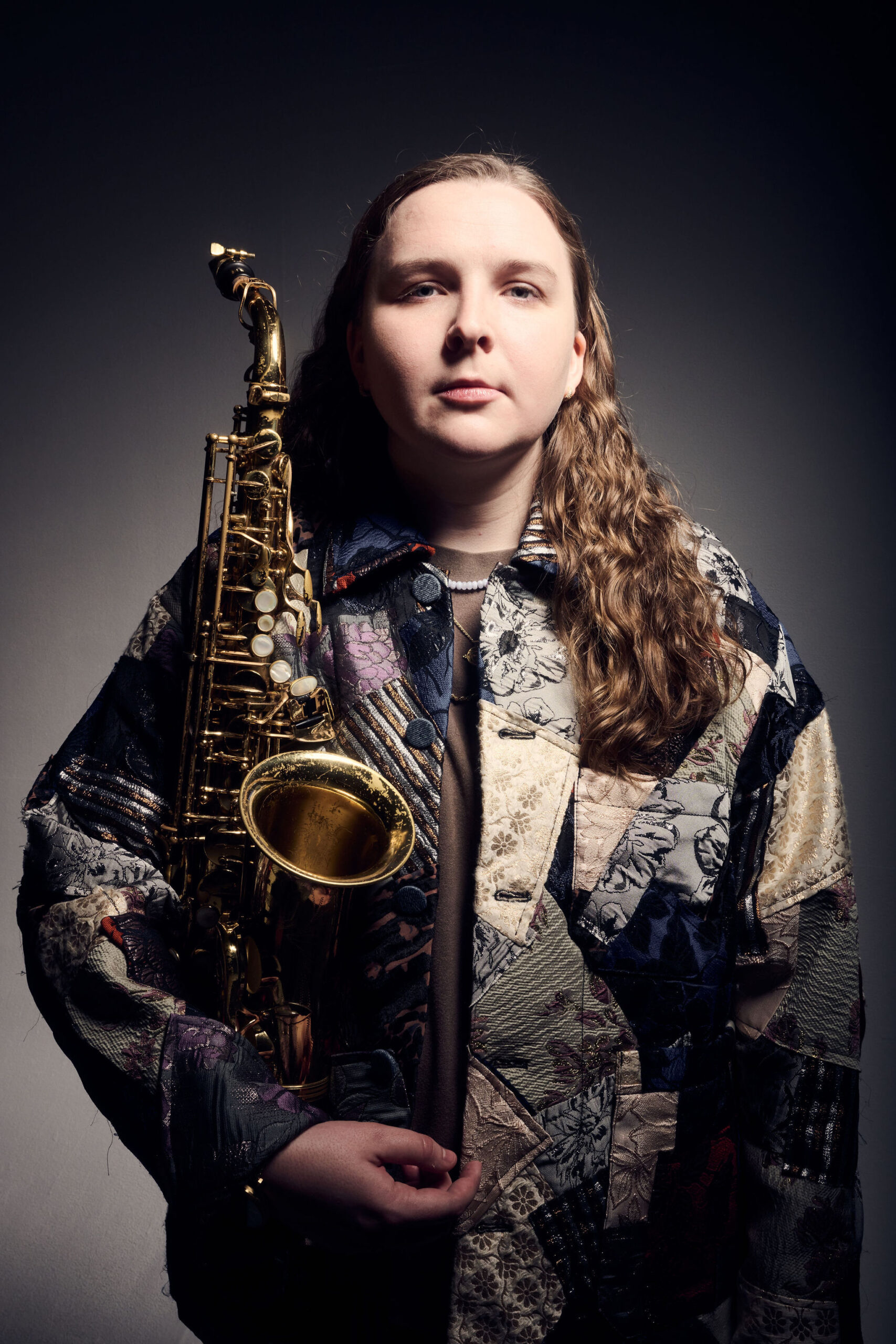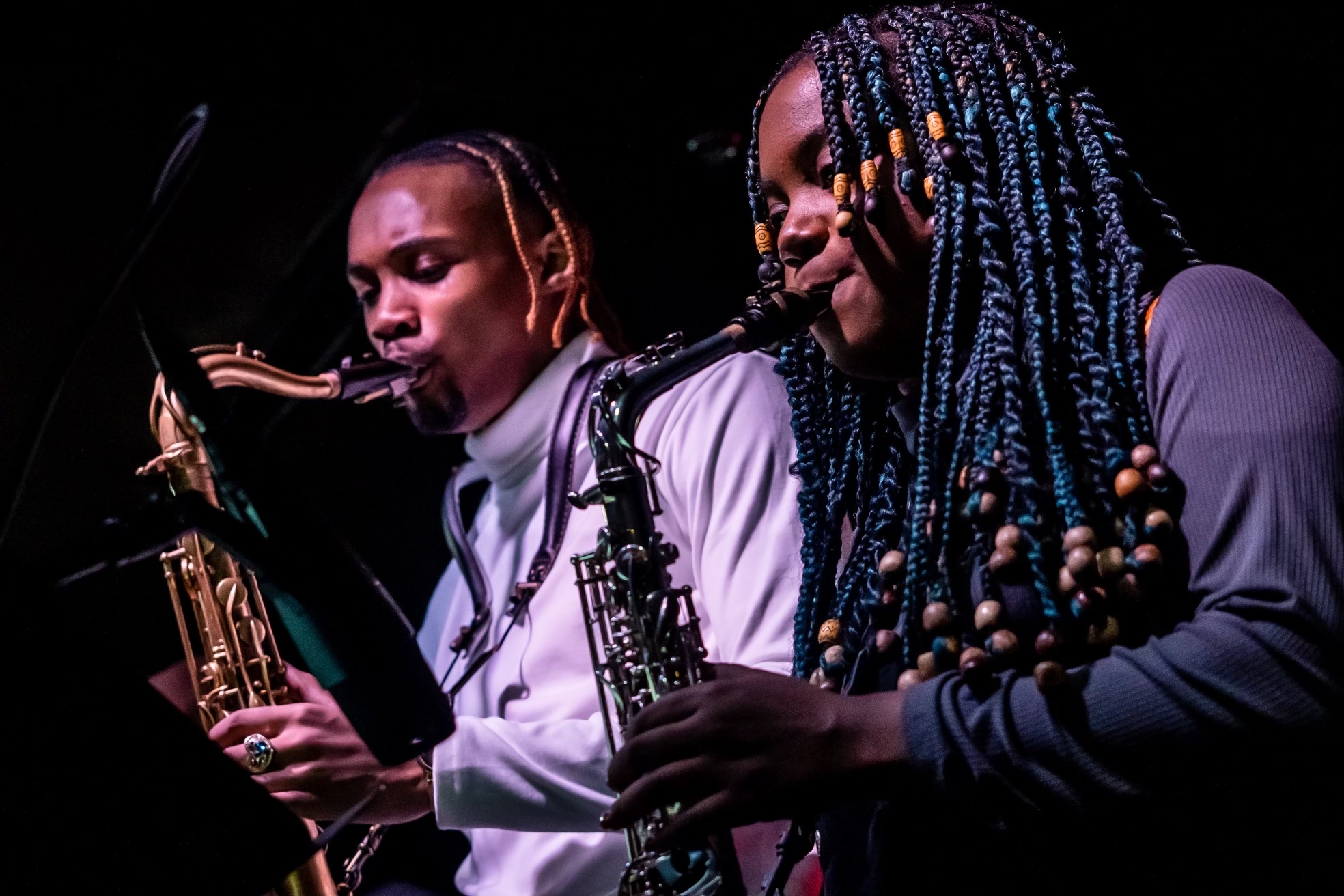Event Info
BRIC JazzFest Night 2, featuring
- Makaya McCraven
- Daniel Villareal
- Terri Lyne Carrington
- Caroline Davis
- Sarah Hanahan
- Ebban & Ephraim Dorsey
- Panel: “Next Jazz Legacy – Why Intergenerational Collaboration and Radical Inclusion are Essential Anchors for a Vibrant and Enduring Jazz Future”
Born from a vision of celebrating jazz’s richness and potential, BRIC JazzFest has become a Brooklyn institution. As Steve Pisano of Feast of Music declared after the inaugural event in 2015, “BRIC has established a new festival destined to become a fixture.” This October, we’ll reach a momentous milestone: the 10th annual BRIC JazzFest.
This year’s theme celebrates a decade of resilience, artistic growth, and genre-bending exploration. We champion the evolution of jazz, fostering opportunities for rising stars like Brandee Younger, who has transformed from a “young and new” harpist in 2015 to our esteemed 2024 Artist Curator. Her innovative and ever-expanding artistry embodies the spirit of the festival.
Just as BRIC JazzFest inaugurated the newly renovated BRIC House in 2015, it has become a cornerstone program, woven into the vibrant tapestry of Brooklyn’s cultural scene.
GET TICKETS
About the Artists

MAKAYA MCCRAVEN IS A PROLIFIC DRUMMER, COMPOSER AND PRODUCER.
His newest album, In These Times, is the triumphant finale of a project 7+ years in the making. It’s a preeminent addition to his already-acclaimed and extensive discography, and it’s the album he’s been trying to make since he started making records.
McCraven believes that the word “jazz” is “insufficient, at best, to describe the phenomenon we’re dealing with.” The artist, who has been aptly called a “cultural synthesizer”, has a unique gift for collapsing space, destroying borders and blending past, present, and future into poly-textural arrangements of post-genre, jazz-rooted 21st century folk music. Profiled in Vice, Rolling Stone, the Guardian, and NPR, among other publications, he and the music he makes today are at the very vanguard of that phenomenon. According to the New York Times, “McCraven has quietly become one of the best arguments for jazz’s vitality”. The artist explained to NPR in 2019, "I don't think what I'm doing is necessarily that far off of the legacy of jazz that I grew up in ... I think one of the things that gives it strength is that people want to argue over it. That's a good sign. That means there's life here."
Born in Paris in the Autumn of 1983 to Hungarian singer and flutist Ágnes Zsigmondi and African-American expat jazz drummer Stephen McCraven, Makaya was raised in a vibrant, creative community in the Northampton, Massachusetts area, where his father often played with artists like saxophonist and ethnomusicologist Marion Brown, multi-instrumentalist Yusef Lateef, and saxophonist Archie Shepp, as well as a cadre of African Gnawa musicians. That scene, with its enticing blend of cultures, helped establish his philosophy around jazz as folk music. Meanwhile, his mother’s music blended Eastern European folk traditions, concurrently shaping his conceptions about the role of music in building and reflecting communities.
“I'm really drawn to folk music. Music of aural tradition, music that is of the people where it's more of a collective experience of music and dance and culture that we all participate in and know as part of our being or as part of who we are.” He sees his work as a continuation of those traditions, noting, “I like to teach the music to musicians by ear, and hope even when I bring in more challenging rhythms, or difficult time signatures, I am able to do it in a way that is of the body and of the people of the earth in a way that’s not necessarily some intellectual experiment, but more something that's dealing with people.”
While immersed as a youth in global folk traditions, he was also a child of the nineties, deeply influenced by sample-based hip-hop. He observed that jazz was sometimes perceived by his peers as “something that was old, corny, white... going to get you beat up.” This directly countered his own experience with the music: “That was such a strange idea to me, because the guys I grew up around were cool, and [weren’t] buttoned up like that.”
Eventually he discovered bridges between jazz and hip-hop, including classic jazz records being sampled by hip-hop producers such as Pete Rock, and began to devote energy to “reappropriate this music to be what it is, what it means to me, and what it means for my people."
After cutting his teeth in the Western Massachusetts music scene, co-founding a jazz-hip hop band called Cold Duck Complex that ultimately opened for The Pharcyde, Digable Planets, and the Wu-Tang Clan, he and his partner (now wife, comparative race studies scholar Nitasha Tamar Sharma) moved to Chicago in 2006. McCraven soon found himself immersed in both the creative and straight-ahead jazz scenes, proving his versatility, and along the way finding a community that mirrored the pulsating scene that birthed him artistically. Within five years’ time, he’d established a name for himself, gigging alongside scene stalwarts like Willie Pickens, Marquis Hill and Jeff Parker.
He first connected with the founders of Chicago’s International Anthem label in late 2011, and across 2012-2013 they hosted and recorded a series of improvised jazz nights featuring his combo at The Bedford, a club situated in what was once an old basement bank vault. McCraven took 48 hours of recordings and sculpted beguiling hip-hop beats, not unlike how Teo Macero looped and assembled Miles Davis’ On the Corner from improvised magic. At the time, McCraven thought of the project, which became the 2015 double LP release In The Moment, as an opportunity to connect and to “find a young audience in this music. It just felt like the right time and a place where I could really connect with people.” That notion proved prophetic: JazzTimes called the album “one of the year's most mesmerizing releases,” the record was an “Album of the Week'' pick by taste-making DJ Gilles Peterson on BBC 6 Music, and it was chosen for “Best of 2015” lists by PopMatters, NPR, and the Los Angeles Times.
McCraven continued to hone his process of live improvisation and sampling with Highly Rare in 2017 (crafted from a live set recorded at Danny’s Tavern in Chicago), 2018’s Where We Come From(CHICAGOxLONDON Mixtape), which was built from recordings of a showcase at London’s Total Refreshment Centre, and Universal Beings (also released in 2018). Universal Beings, consisting of augmented live sessions in Chicago and New York, in addition to pop-up studio sessions in London and Los Angeles, concretely reflects his borderless multi-national ethos. The work featured varying configurations of international players, including Nubya Garcia and Shabaka Hutchings from London, Junius Paul and Tomeka Reid of Chicago, Anna Butterss and Miguel Atwood-Ferguson from Los Angeles, and Brandee Younger and Dezron Douglas from New York.
The title of the album was culled from a sampled passage on the track “Brighter Days Beginning,”, in which percussionist Carlos Niño offers, “We’re universal beings,” a theme of borderlessness that resonated deeply with McCraven, who grew up in a multicultural household and community. “I’m not beholden to this border or this city,” McCraven told Vice in 2018, “What is a place? Other than the people. It’s just dirt, you know?” The resulting album was called “radiant” and “hypnotic” by Pitchfork.
In 2019, McCraven both delivered a triumphant Jazz Night in America performance at South Shore Cultural Center in Chicago, and mounted a multimedia performance of an early iteration of what became his new album In These Times, at the Walker Arts Center in Minneapolis.
In the meantime, he remixed Gil Scott-Heron’s final album (2010’s I’m New Here) for 2020’s We’re New Again: A Reimagining by Makaya McCraven, issued Universal Beings E+F Sides(also in 2020), and delved into the venerable Blue Note Records catalog in 2021 for Deciphering the Message, each project also employing new improvisations and sampling, helping to further cement his “beat scientist” moniker. Concurrently, the seeds for 2022’sIn These Times were budding, and their nurseries were stages around the globe. McCraven explains, “As I've been touring, I've been performing music off of the record In These Times... When In the Moment took off and I started touring a lot, we would go on the road and 50% of the music was just my concept and my compositions.”
In These Times, a collection of polytemporal compositions inspired as much by broader cultural struggles as McCraven’s personal experience as a product of a multinational, working class musician community, is the recording that McCraven has been trying to create for 7+ years, as it’s been slowly cooking in the background while his other works were released. He began recording In These Times seven years ago, but “for whatever reason, Universal Beings just came to fruition much quicker. It just took more time for this to mature into everything it's become. With the success of Universal Beings and the Universal Beings concerts that we did (with Red Bull) in Chicago at South Shore Cultural Center and le poisson rouge in New York, I had an opportunity to realize the record not as a collection of four sides of trios and quartets, but I turned that record as a performance into a 10 to 12-person concert, and that experience ended up evolving my approach to In These Times.”
In These Times encompasses all he’s lived through, as well as his lineage, while also pushing the music forward. Music critic Passion of the Weiss suggested that “McCraven’s work, both with younger players and the sounds of older recordings, is part of a necessary conversation about the next evolution of the Black improvised music known colloquially as ‘jazz.’ He’s found the threads connecting the past with the present, and is either wrapping them with new colors and textures, or he’s plucking them gleefully like the strings of a grand instrument.” McCraven concurs: “To me, that is the tradition that I want to try to take part in. Being well-rooted, but walking into the future, is really what all of the leaders in this music have done that I admire. And I think that resonates with people. Something that's like how we know it, but is evolving... It's just where I am at, where we're at, and the evolution of that, and that's what I'm trying to be.”
- Words by Ayana Contreras, June 2022
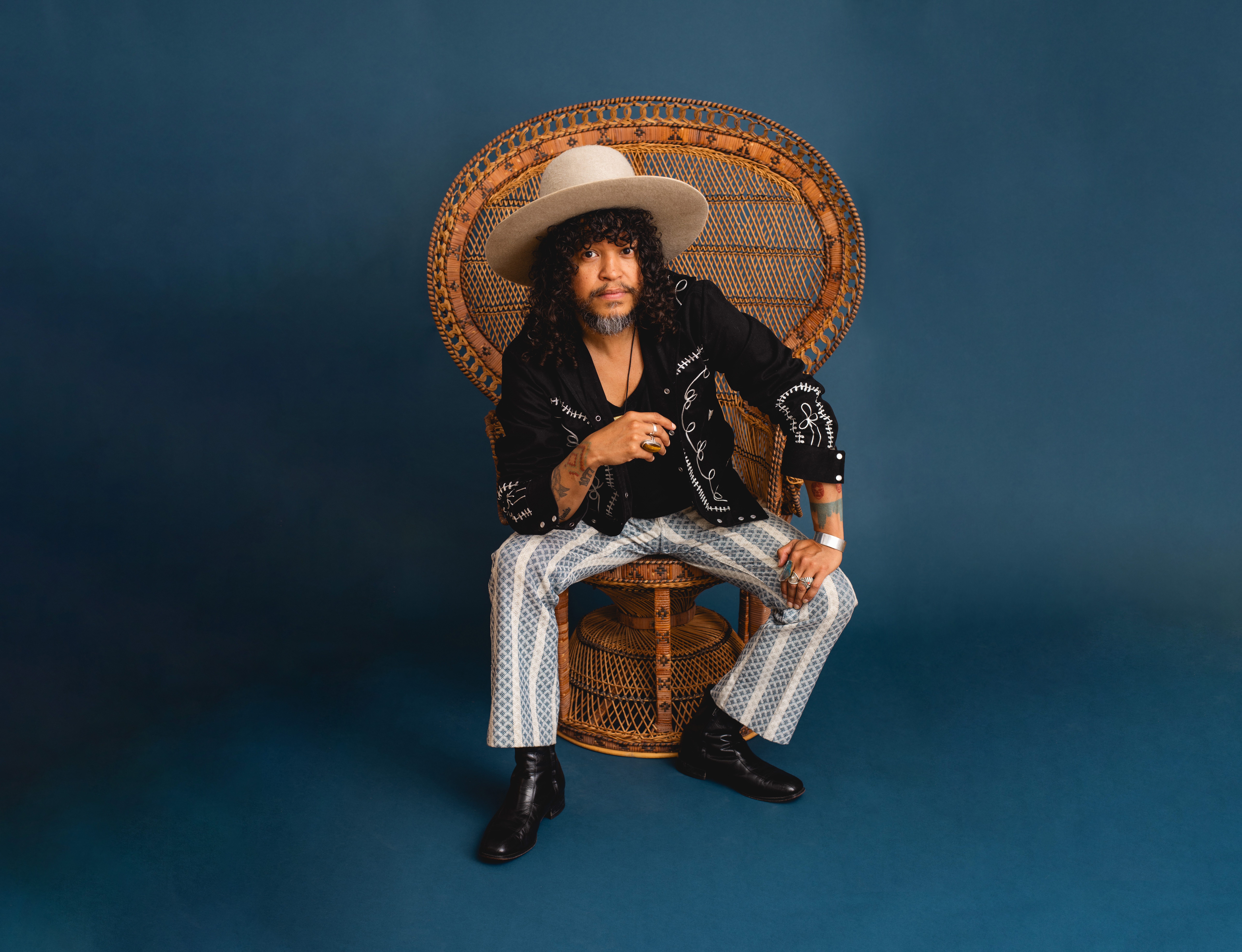
Panamá 77 – a vibrant and verdant suite of multi-textural, jazz-laced psychedelic instrumental folk- funk – is the debut album by Panamá-born, Chicago-based drummer and DJ Daniel Villarreal.
Though it’s a debut work in the eyes of the world, Villarreal has long been a widely known and beloved character on the Chicago music scene. On almost any night of the week, you’ll find him DJing at least one spot on bustling 18th Street in his home neighborhood of Pilsen. (The decadent track “18th & Morgan” is an homage to that strip, with its lowrider meets Roy Ayers vibe, vividly depicting Villarreal’s daily life driving to a gig in his classic baby-blue Mercedes sedan, wearing a beaver-skin Stetson and tinted aviators.) If he’s not there, he’s playing drums with Dos Santos, Valebol, The Los Sundowns or Ida y Vuelta (all bands he co-leads), or sitting in with Wild Belle or Rudy De Anda.
Villarreal may be most known for his big style and magnetic personality, but to musicians on the scene, it’s as much for his talents as a malleable and reliable drummer, with a deep pocket in many styles and sounds. Through Dos Santos and Ida y Vuelta, he’s demonstrated a range of knowledge and skill in various stripes of folkloric Latin music; but, ironically, he didn’t really play traditional Latin music until he moved to the States from his hometown Panamá City. His deepest roots in drumming are from the progressive punk and hardcore scenes of Central America, where his bands NOHAYDIA and 2 Huevos 1 Camino were active in the late 90s. Those formative experiences are the foundation of his career in music.
After his teen years thrashing on the punk scene, Villarreal started a life-changing tutelage with Freddy Sobers, the drummer of El General and Nando Boom (both known for pioneering reggaeton music in Panamá). “He taught me how to play all kinds of rhythms and told me I didn’t have to just play punk music,” Villarreal told the Chicago Reader in 2021. “He played everything from Rush to reggaeton to Chick Corea to salsa music… He told me if I wanted to be a good drummer, I had to learn all the styles. He took me under his wing, and I learned a lot from him.”
Villarreal evokes another Panamanian legend in “Patria,” a tribute to the organist and composer Avelino Muñoz. “My father, who also played the organ, used to listen to him growing up. I was always curious about its haunted sound. This recording is a total obeisance to Muñoz, my father and my country.”
Villarreal migrated to the US in the early 2000s. His first decade was spent living on a farm near Woodstock, Illinois, where he was a social worker, connecting migrant laborers with community health clinics. He also spent that time raising his two daughters, Estelle and Fania. But all his spare time went to nurturing his passion for drums. As he found more collaborators, played more gigs and became more embedded in the music community, in the early 2010s he moved down the highway into the City of Chicago, determined to grind it out as a full-time musician.
After another decade of non-stop sideman work, which included the growing national awareness and success of Dos Santos, Villarreal began to imagine what his own solo record could be. A handful of studio experiments in 2017 and 2018 got him close to the sound in his mind, but it wasn’t until he traveled to Los Angeles for a gig in 2019 that he caught a lasting spark. A simple stereo recording of Villarreal improvising with a first-time ensemble of friends – including Elliot Bergman, Jeff Parker, Kellen Harrison, and Bardo Martinez – inspired him to go into album-forming mode. The songs
“Bella Vista” and “Activo” are excerpts from that first session, with added layers of auxiliary percussion, edited and shaped by Villarreal with engineer Dave Vettraino.
As Villarreal and Vettraino dove into post-production, the need for more material to fill out the album became clear, so more sessions were scheduled with players from Villareal’s and International Anthem’s shared circles. Guitarist Nathan Karagianis, who also plays with Dos Santos, joined them at Jamdek Studios in Chicago along with organist Cole DeGenova, and bassist Gordon Walters. In Los Angeles at Chicali Outpost (aka the garden behind International Anthem co-founder Scottie McNiece’s home), Villarreal recorded again with Bardo Martinez on bass and synths, Kyle Davis on keyboards, Anna Butterss on bass, and Jeff Parker, again, on guitar.
The Chicali Outpost session was recorded by engineer Ben Lumsdaine outdoors in open air, mainly because of safety precautions (it was in October 2020, and even the smallest of gatherings were still rare then), but also because the climate and context of the garden was ripe for music-making. One of the most electric tunes from that session is “Uncanny,” a psychedelic funk dub with spacey William Onyeabor-style synths. Villarreal recalls that “we were jamming in Bardo's little garage studio the night before we did the recording at Scottie’s house. I remember starting the main groove and Bardo jumping in with a wacky bass line. We celebrated how weird it was even though we weren't playing the same groove together, it came out in a strange, wonderful way that surprised us."
Another highlight from those recordings is “In/On.” The base track is built around an improvisation by Villarreal, Butterss, and Parker, which was one of the first bits of music the three of them made together. It was also one of the first times Parker had played in person with other musicians in the almost 6 months since the pandemic began, and the joy of collective improvisation can be felt emanating from every note he plays. As Villarreal describes it, “for me, the song is about how we are all IN and ON. As if we are about to start something so you walk in and turn an ON switch. No one knows what's going to happen after that but we are all into it. We are all IN. I also think it’s a fun reference because in Spanish there is only one word - ‘en’ - for both of those English words ‘in’ and ‘on’.”
Villarreal spent much of 2021 adding layers of percussion, editing and piecing the music together with Vettraino at International Anthem studios in Chicago. Other additions made in the final stages included Aquiles Navarro (of Irreversible Entanglements), who recorded horns for “Uncanny” at his family’s home in Panamá. Marta Sofia Honer wrote string arrangements and recorded a Curtis Mayfield-style symphony of violins and violas for “Cali Colors” and “18th & Morgan.” And back in LA for a final overdub session at Martinez’s garage studio, Villarreal and Martinez added backing vocals and synths to “Uncanny,” and even more synths to “18th & Morgan” and “Parque En Seis.” As the album took its final form, Villarreal named the collection Panamá 77, an homage to his birth place and year.
Villarreal says: “This album is an affirmation of both my origin story and who I am today. I see my life and my music as a collaboration of improvisation and intention all in the spirit of community and joy.”

GRAMMY® Award-winning drummer, producer, educator, activist, NEA Jazz Master, and 2019 Doris Duke Award recipient, Terri Lyne Carrington debuts new band Social Science, to boldly confront social justice issues with the eclectic collaborative double album, Waiting Game, on Motéma Music.
Galvanized by seismic changes in the ever-evolving social and political landscape, Terri Lyne Carrington and Social Science confront a wide spectrum of social justice issues. The band’s stunning double disc debut, Waiting Game, immediately takes its place in the stirring lineage of politically conscious and activist music, expressing an unflinching, inclusive and compassionate view of humanity’s breaks and bonds through an expansive program melding jazz, R&B, indie rock, contemporary improvisation, and hip-hop.
Released by Motéma Music, Waiting Game is as thought-provoking and artistically evocative as it is musically exhilarating. Produced by Carrington and built around her friendship and collaboration with co-producers, pianist Aaron Parks and guitarist Matthew Stevens, and additional band members Morgan Guerin (bass & sax), Debo Ray (vocals) and Kassa Overall (MC/DJ), the album features a diverse ensemble that spans multiple generations, racial, ethnic, sexual and gender identities. The band states: “Along with a message of wakefulness, inclusiveness, and noncompliance, we’ve summoned our musical influences to offer an eclectic alternative to the mainstream. Music transcends, breaks barriers, strengthens us, and heals old wounds. Music is Social Science.”
The vocal-driven DISC 1 features the band along with a powerhouse lineup of featured guests: MC’s Rapsody, Maimouna Youssef (aka Mumu Fresh), Kokayi and Raydar Ellis; vocalist Mark Kibble (Take 6); trumpeter Nicholas Payton; and spoken word artists Malcolm Jamal-Warner and Meshell Ndegeocello words of resistance are pulled from recordings of Marilyn Buck, Angela Davis, Leonard Peltier, Assata Shakur and Laura Whitehorn as well as a special, newly recorded, contribution from Mumia Abu Jamal from “In Prison Nation Radio.”
On the purely instrumental DISC 2 is a breathtaking, 42-minute improvised suite entitled “Dreams and Desperate Measures,” by Carrington, Parks, Stevens and long-time Carrington cohort, bassist Esperanza Spalding. With additional orchestration by Edmar Colón, the suite presents an adventurous excursion musing on the idea of freedom, both personal and musical.
As Social Science was in its early stages, Carrington also founded the Institute of Jazz and Gender Justice at Boston’s Berklee College of Music, where she holds the position of Zildjian Chair in Performance. Both projects point to Carrington’s drive to combine her musical passion with her profound regard for humanity, inflamed by the cultural divisiveness brought into the light by the 2016 presidential election. “I think there’s an awakening happening in society in general,” she says. “I feel a calling in my life to merge my artistry with any form of activism that I’m able to engage in.”
Waiting Game is not the first time that Carrington has addressed her concerns for society, though it is the most direct and impactful. On her 2013 release Money Jungle: Provocative in Blue (GRAMMY winner for Best Jazz Instrumental Album), she offered a 21st-century reimagining of the Ellington-Mingus-Roach classic with a jaundiced eye on late-stage capitalism. Her previous and first GRAMMY-winning album, The Mosaic Project (2012) let its all-star, all-female ensemble speak for itself, though its argument for gender equity in jazz rang through loud and clear.
At that time, Carrington preferred to focus on the music of The Mosaic Project rather than the gender of its musicians, though her thinking has shifted in the years since. “For a long time women in jazz didn't really embrace the issue because many of us were involved and somewhat invested in this patriarchal system that’s controlled jazz for so long,” she explains. “The culture nudged us to want to be considered one of the guys. There came a turning point for me where I realized we had the whole thing backwards. We need to be our authentic selves playing this music, and that needs to be accepted and nurtured. The same opportunities that help to develop young male musicians need to be there to develop young female musicians, and traditionally that hasn’t been the case, especially in early stage development.”
Carrington cites as one of her inspirations for the change in approach the Black Youth Project 100 (BYP100), the African American youth organization founded by activists Charlene Carruthers and Dr. Cathy Cohen in the wake of George Zimmerman’s acquittal for the killing of Trayvon Martin. The organization’s work helped Carrington to more fully integrate her personal identity into her musical life.
“I’ve realized that at this point in my life the lines between my politics and personal life have become blurred,” she says. “BYP100 really resonates with me, as a political home for anti-capitalists, radical Black feminists, abolitionists, artists, educators and many other types of freedom fighters. It’s helped me to see the value in the idea of collective liberation, which is really the core message of Waiting Game. I aspire to see the world through a Black, Queer, Feminist lens and want to encourage others to do so as well, because no one is liberated until everyone is.”
“In order to empower the current generation of women and girls,” reflects Matthew Stevens,” we must also engage men and boys. Gender equality should never be sold as a zero-sum game, but rather, (as research has repeatedly shown by studying counties with higher rates of gender equality) as being in everyone’s best interest. For white men” he adds, “the unconscious luxury of not being self aware—unaware of our gender, race and privilege— is, in fact, destructive and can’t continue to be left unexamined if we want a more equal society.”
The subjects addressed on Waiting Game run the gamut of social concerns: mass incarceration (“Trapped in the American Dream,” featuring Kassa Overall’s bold rap); police brutality (“Bells [Ring Loudly]),” intoned by actor Malcolm-Jamal Warner); homophobia (“Pray The Gay Away,” featuring Nicholas Payton’s impassioned horn); the genocide of indigenous Americans (“Purple Mountains,” featuring Kokayi); political imprisonment (“No Justice [for political prisoners]),” with Meshell Ndegeocello’s recitation in honor of iconic resistance voices, and gender equity (as expressed in the powerful messages of “The Anthem,” featuring Rapsody and “If Not Now,” featuring Maimouna Youssef).
“There is a tremendous amount of work to be done if we want to make this country actually live up to its as-yet-unrealized aspirations toward true freedom and equality,” adds Aaron Parks. “Activists and organizers have been doing a lot of the heavy lifting for a long time, and are absolutely crucial, but there’s an important role for everyone to play in this process. As a member of Social Science, I aim to listen to, learn from, and amplify the voices of those who have been far too often marginalized and unheard. To help to share these stories, these songs of outrage, of hope, of despair, of healing, of love.”
Sonically, Waiting Game is a vivid reflection of the broad horizons of the band’s musical tastes, embellished and amplified by their receptiveness to dynamic collaboration. In regard to Carrington, this outing’s genre-blurring blend is more dazzling and expansive than anything she’s done in the past; what’s most impressive about Waiting Game is the way that it allows Carrington’s social consciousness to catch up to her virtuosic musicianship.
“In previous projects I’ve hinted at my concerns for the society and the community that I live in,” Carrington says. “But everything has been pointing in this direction. At some point you have to figure out your purpose in life. There are a lot of drummers deemed ‘great.’ For me, that’s not as important as the legacy you leave behind.”
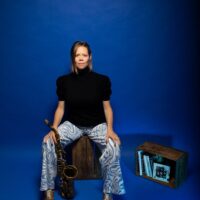
Caroline Davis is a dynamic saxophonist whose music bridges jazz, experimental R&B, and protest music. Her musical journey began in Singapore, where she first explored sound as a child, and was further shaped in Atlanta, Georgia, where she was influenced by R&B and gospel. Over the years, Davis has released seven albums as a leader, with projects spanning multiple genres, including her jazz-leaning Portals and her protest band Alula. She has earned numerous accolades, including DownBeat’s Critic’s Poll Rising Star Alto-Saxophonist, and her work has been praised by major outlets like NPR and The New York Times.
Beyond performance, Davis is deeply involved in mentorship and social justice. She has participated in mentorship communities such as the Kennedy Center's Betty Carter Jazz Ahead Program and Jen Shyu/Sara Serpa’s Mutual Mentorship Program. With a Ph.D. in Music Cognition, Davis integrates cognitive science into her compositions and teaching. She teaches at The New School and Manhattan School of Music, blending her knowledge of music and psychology. As an advocate for social justice, Davis organizes events highlighting the intersection of art, gender, and carceral justice.

Sarah Hanahan
Sarah Hanahan is an up-and-coming jazz saxophonist in New York City. Sarah is a graduate of
the Jackie McLean Institute of Jazz at the Hartt School of Music where she received her
Bachelors degree in 2019, as well as The Juilliard School where she received her Masters degree
in 2022. She has had the privilege of studying with well-known performers Abraham Burton, Nat
Reeves, Steve Davis, Billy Drummond, and Marc Cary.
Recently, Sarah has worked with many renowned musicians including Jeff “Tain” Watts, Nat
Reeves, Peter Martin, Emmet Cohen, Steve Davis, Billy Hart, Dee Dee Bridgewater, Marc Cary
and many others. Sarah tours both nationwide and internationally with her own band, and plays
regularly in renowned venues around NYC such as Dizzy’s, Smoke Jazz Club, Smalls, and more.
She also recently had the opportunity to play for the 2023 NEA Jazz Masters Tribute Concert at
the Kennedy Center honoring Sue Mingus with the Mingus Dynasty Band. Sarah has toured
nationwide and around the world with Joe Farnsworth, Peter Martin, Ulysses Owens Jr. and
Generation Y, Sherrie Miracle and the Diva Orchestra, and the Grammy award-winning Mingus
Big Band.
Sarah was recently featured in the first-ever class of NPR Jazz Night in America’s Youngbloods
alongside Samara Joy, Immanuel Wilkins, Isaiah J. Thompson, and Sean Mason. The series
features “five up-and-coming jazz geniuses who are revolutionizing their genre” - all of whom
are under the age of 30. She is a generational talent on the rise. Her debut album, Among Giants,
featuring Marc Cary, Nat Reeves, and Jeff “Tain” Watts is out now on all platforms!
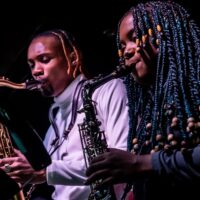
Ebban and Ephraim Dorsey are 20 and 21-year-old saxophonists, composers, bandleaders, and rising stars in the contemporary jazz scene. The multi-talented siblings have been playing together since they were 9 and 10. Both have been members of Carnegie Hall’s NYO Jazz, Herbie Hancock Institute’s National Peer-to-Peer All-Star Jazz, JAZZ HOUSE KiDS, and Peabody Jazz Ensembles between 2020-2024.
Natives of Baltimore, Maryland, the Dorsey siblings currently attend the Peabody Institute of the Johns Hopkins University as full scholarship recipients in the jazz program, and they are both graduates of the Baltimore School for the Arts. To date, they have performed at premiere venues and events such as The Kennedy Center, Blue Note NYC, Dizzy’s Club Coca Cola, Caton Castle, Keystone Korner, BRIC Jazz Festival, Montclair Jazz Festival and Havre de Grace Jazz and Blues Fest. The Dorseys have flourished with the support of a brilliant village of musicians, and they continue to strive with their gifts as they travel and perform with some of the best local, national and international recording artists. The siblings have performed with and been mentored by industry giants including Kamasi Washington, Terrace Martin, Kenny Garrett, Dontae Winslow, Carl Grubbs, Gary Thomas, Gary Bartz, José James, Melissa Walker, Christian McBride and many more.
Both siblings have recorded on NYO Jazz’s debut album “We’re Still Here” and the Dynamic Album Project - “Craig Alston: Live in Baltimore”. Ebban’s improvisational prowess is also featured extensively on José James’ album “On & On”, a jazz tribute to Erykah Badu, which resulted in being invited on her first international tour in 2023. Ephraim was also cast to play a young Kamasi Washington in his short film “As told to G/D thyself”, which was nominated for awards at the Sundance and La Roche-sur-Yon International Film Festivals.
Destined for greatness, the Dorseys continue to blaze a trail forward with their trademark humility, melodic invention and forward-thinking musical concepts. Their performances can be described as two different voices coming together to create a healing, ethereal, and emotional experience for listeners as well as themselves.
Come early to enjoy an exclusive panel discussion!
Next Jazz Legacy – Why Intergenerational Collaboration and Radical Inclusion are Essential Anchors for a Vibrant and Enduring Jazz Future
Fri, Oct. 18
6:30PM @ BRIC JazzFest
Join us for a an inspiring panel discussion in partnership with Next Jazz Legacy ft. BRIC JazzFest performers Makaya McCraven, Milena Casado, and Terri Lyne Carrington, moderated by Marcus J. Moore!
These trailblazing artists will discuss their experiences with mentorship in jazz, their vision for greater inclusivity in the genre, and the resulting potential for artistic evolution. This conversation is inspired by New Music USA’s Next Jazz Legacy program, which is advancing equity in jazz through mentorship, intergenerational collaboration, and radical inclusion.
Next Jazz Legacy is a partnership between New Music USA and the Berklee Institute of Jazz and Gender Justice with support from the Mellon Foundation.

More Events
- BRIC House
- BRIC House
